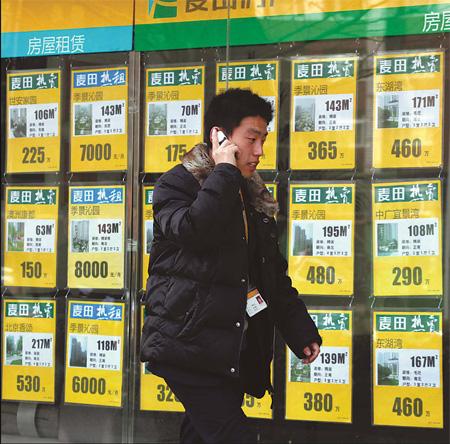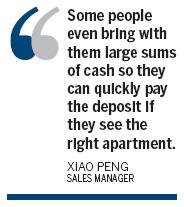
A real estate agent walks past a crowded window full of available properties.[ Zou Hong / China Daily]
More are investing despite government's efforts to cool local property market
Almost one-quarter of Beijing residents who hoped to buy a home during the first three months of 2010 wanted to do so for investment purposes, despite the municipal government's recent efforts to cool speculation in the hot housing market.
The 23.1 percent was 1.8 percent higher than the figure in the previous quarter, according to a survey conducted by People's Bank of China.
The figure has been climbing since the second quarter of 2009 and is now at its highest level for the past two years.
But the survey found the overall number of people wanting to buy a home was down.
Only 16.9 percent of Beijingers expect to buy a home during the coming year - 4.5 percent less than the previous quarter.

And more than half of respondents said they had no plans to buy a home in Beijing.
The survey was distributed among 1,300 Beijing residents. Some 1,112 valid responses were collected and analyzed.
Local property agents said the proportion of homes selling to speculators is likely to be even higher than 23.1 percent in hot regions, such as Tongzhou district and Wangjing area.
"We made investigations and found that investment-led purchases accounted for more than half of sales in Tongzhou and Wangjing," said Gong Ping, manager of the market research department at Centaline China property agency.
"Some buyers took a wait-and-see approach in January and February but after some plots of land were snapped up by property developers in mid March, purchasers started moving," Gong said.
Xiao Peng, a sales manager at Homelink House Agency working at the company's Tongzhou branch, said he had not seen such a crazy situation during the past five years.
"Every day, when I go to work, a bunch of house investors follow me into the store, as if they are working in my company too," Xiao laughed.
"We wait for sellers together and if one comes, we immediately pour out to see his or her house. Because they are afraid of losing out to other investors, some people even bring with them large sums of cash so they can quickly pay the deposit if they see the right apartment."
Yu Liang, a 29-year-old woman from Hunan who works at a Beijing law firm, said she and her husband have bought two apartments in the past seven months.
"We heard good news about the plans for Tongzhou new town and expect a price rise in the future, so we have set aside 50,000 yuan for a deposit and go to property agencies each day looking for a suitable house," Yu said.
Beijing municipal government released 11 polices in February designed to make housing more affordable for less well-off would-be purchasers and aimed at getting rid of price manipulation in the real estate market.
The policies look to have had a limited impact so far.
House trade volume continued to grow in March and prices rose to new record highs.
According to statistics from Centaline China, more than 70 percent of commercial apartments now have an asking price in excess of 20,000 yuan per sq m. Property in Tongzhou saw a 50 percent rise in 2009.
During the first quarter, the average price of Beijing's commercial apartments reached 21,880 yuan per sq m, up 88.4 percent from the 11,615 during the same period last year. The average price of new property within the Fifth Ring Road passed 30,000 yuan per sq m last month.
During the three-day Tomb Sweeping Festival, 672 second-hand homes sold in Beijing, which was up 51 percent on the same period last year.





